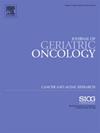The impact of electronic patient-reported outcomes presentation during multi-disciplinary tumor board on clinician discussion of older adults' fitness and preferences
IF 3
3区 医学
Q3 GERIATRICS & GERONTOLOGY
引用次数: 0
Abstract
Introduction
Treatment of pancreatic cancer often entails multiple modalities (e.g., chemotherapy, surgery, radiation) that vary in intensity, timing, and toxicity profiles. Some treatment options are only recommended for medically ‘fit’ patients regardless of age, yet formal fitness measures (such as the geriatric assessment [GA]) and patient preferences are seldom utilized during treatment decision-making.
Materials and Methods
The INtegrating Systematic PatIent-Reported Evaluations into Multi-Disciplinary Tumor Board (INSPIRE-MDTB) intervention involves the presentation of GA and treatment preferences data during tumor board discussions of older patients with stage I-IV pancreatic adenocarcinoma. This qualitative study recorded, transcribed, and inductively analyzed historical (November 2021–February 2022) and intervention (September 2022–June 2023) MDTBs using NVivo software. A constant comparative method was used to establish a grounded scheme representative of clinicians' characterization of patients' fitness and preferences during decision-making.
Results
Recordings of the primary MDTB presentation of 31 historical and 49 intervention patients with similar sex (52 %; 53 % female), age (m = 68.1; 72.3), race (65 %; 59 % White), and cancer stage (26 %; 22 % stage IV) were included. Although GA was captured for all included patients, it was not discussed in any historical cases, but was in 94 % of intervention cases. When compared to historical controls, INSPIRE patients had more frequent discussions of (1) cancer-related factors (e.g., size, location, rate of progression; 35 % vs. 43 %), (2) individual risk factors (e.g., age, comorbidities, tolerance; 90 % vs 98 %), and (3) psychosocial factors (e.g., health literacy, social support, substance use; 19 % vs 33 %). Identified preference domains were discussed in 39 % of historical and 80 % of intervention patients, with notably higher rates of discussion of patients' concerns regarding physical (0 %; 35 %) and mental/emotional (0 %; 20 %) side effects, ability to work (0 %; 10 %), and the logistics and convenience of treatment (6 %; 14 %).
Discussion
The INSPIRE intervention enhanced MDTB discussion of patient fitness and preferences and represents a promising approach for fostering consistent and systematic presentation and discussion of patient-reported data, such as the GA and treatment preferences. This adds to our previous findings that INSPIRE was feasible, acceptable, appropriate, and time-effective according to patients and provider participants.
在多学科肿瘤会议上,患者报告的电子结果报告对临床医生讨论老年人健康和偏好的影响
胰腺癌的治疗通常需要多种方式(如化疗、手术、放疗),其强度、时间和毒性各不相同。一些治疗方案只推荐给医学上“适合”的患者,而不考虑年龄,然而在治疗决策中很少使用正式的健康测量(如老年评估[GA])和患者偏好。材料和方法将系统化的患者报告评估整合到多学科肿瘤委员会(INSPIRE-MDTB)干预中,包括在肿瘤委员会讨论老年I-IV期胰腺腺癌患者的GA和治疗偏好数据。本定性研究使用NVivo软件记录、转录和归纳分析历史mdtb(2021年11月- 2022年2月)和干预mdtb(2022年9月- 2023年6月)。采用恒定比较方法建立了一个接地方案,代表临床医生在决策过程中对患者适应性和偏好的表征。结果31例既往患者和49例性别相近的干预患者的原发性MDTB表现记录(52%;53%女性),年龄(m = 68.1;72.3),种族(65%;59%白人),癌症分期(26%;22%为IV期)。虽然所有纳入的患者都有GA,但没有在任何历史病例中讨论,但在94%的干预病例中有GA。与历史对照组相比,INSPIRE患者更频繁地讨论(1)癌症相关因素(例如,大小、位置、进展速度;(2)个体风险因素(如年龄、合并症、耐受性;90% vs 98%),以及(3)社会心理因素(例如,卫生知识普及、社会支持、药物使用;19% vs 33%)。39%的病史患者和80%的干预患者讨论了确定的偏好域,讨论患者对身体的担忧的比例明显更高(0%;35%)和精神/情感(0%;20%)副作用,工作能力(0%;10%)、物流和治疗便利性(6%);14%)。INSPIRE干预措施加强了MDTB对患者健康和偏好的讨论,代表了一种有希望的方法,可以促进患者报告数据(如GA和治疗偏好)的一致和系统的呈现和讨论。这增加了我们之前的研究结果,即根据患者和提供者参与者,INSPIRE是可行的、可接受的、适当的和时效性的。
本文章由计算机程序翻译,如有差异,请以英文原文为准。
求助全文
约1分钟内获得全文
求助全文
来源期刊

Journal of geriatric oncology
ONCOLOGY-GERIATRICS & GERONTOLOGY
CiteScore
5.30
自引率
10.00%
发文量
379
审稿时长
80 days
期刊介绍:
The Journal of Geriatric Oncology is an international, multidisciplinary journal which is focused on advancing research in the treatment and survivorship issues of older adults with cancer, as well as literature relevant to education and policy development in geriatric oncology.
The journal welcomes the submission of manuscripts in the following categories:
• Original research articles
• Review articles
• Clinical trials
• Education and training articles
• Short communications
• Perspectives
• Meeting reports
• Letters to the Editor.
 求助内容:
求助内容: 应助结果提醒方式:
应助结果提醒方式:


